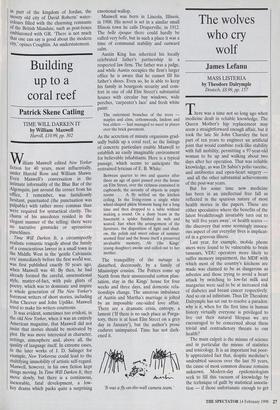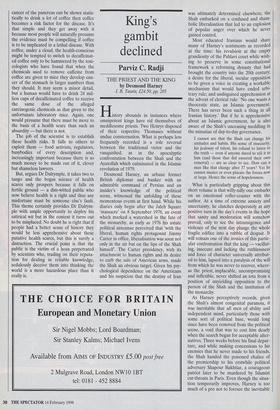The wolves who cry wolf
James Lefanu
MASS LISTERIA by Theodore Dalrymple Deutsch, £8.99, pp. 157 here was a time not so long ago when medicine dealt in reliable knowledge. The Queen Mother's hip replacement may seem a straightforward enough affair, but it took the late Sir John Charnley the best part of ten years to engineer an artificial joint that would combine rock-like stability with full mobility, permitting a 97-year-old woman to be up and walking about two days after her operation. That was reliable knowledge, as was Dr Sabin's polio vaccine, and antibiotics and open-heart surgery and all the other substantial achievements of the post-war years.
But for some time now medicine has been in an intellectual free fall as reflected in the spurious nature of most health stories in the papers. These are either speculative where the benefits of the latest breakthrough invariably turn out to be 'still five years away', or health scares the discovery that some seemingly innocu- ous aspect of our everyday lives is implicat- ed in a grievous illness.
Last year, for example, mobile phone users were found to be vulnerable to brain tumours, VDU operators more likely to suffer memory impairment, the MDF with which most of the country's kitchens are made was claimed to be as dangerous as asbestos and those trying to avoid a heart attack by switching to low-fat milk and margarine were said to be at increased risk of diabetes and breast cancer respectively. And so on ad infinitum. Thus Dr Theodore Dalrymple has set out to resolve a paradox: why is it, when for the first time in human history virtually everyone is privileged to live out their natural lifespan we are encouraged to be concerned about these trivial and contradictory threats to our health?
The main culprit is the misuse of science and in particular the misuse of statistics and toxicology. It is an important but poor- ly appreciated fact that, despite medicine's undoubted success over the last 50 years, the cause of most common disease remains unknown. Modern-day epidemiologists seek to fill this vacuum of knowledge by the technique of guilt by statistical associa- tion — if those unfortunate enough to get cancer of the pancreas can be shown statis- tically to drink a lot of coffee then coffee becomes a risk factor for the disease. It's that simple and they get away with it because most people will naturally presume the evidence must be compelling if coffee is to be implicated in a lethal disease. With coffee, under a cloud, the health-conscious might be tempted to switch to decaffeinat- ed coffee only to be hammered by the toxi- cologists who have found that when the chemicals used to remove caffeine from coffee are given to mice they develop can- cer of the stomach in larger numbers than they should. It may seem a minor detail, but a human would have to drink 24 mil- lion cups of decaffeinated coffee to receive the same dose of the alleged carcinogenic chemicals as that given to the unfortunate laboratory mice. Again, one would presume that there must be more to the basis of a health scare than such an absurdity — but there is not.
The job of the scientist is to establish these health risks. It falls to others to exploit them — food activists, regulators, busybodies of every description and, increasingly important because there is so much money to be made out of it, clever but shameless lawyers.
But, argues Dr Dalrymple, it takes two to tango and the bogus science of health scares only prospers because it falls on fertile ground — a dim-witted public who now believe health is a right and thus any misfortune must be someone else's fault. This theme certainly provides Dr Dalrym- ple with ample opportunity to deploy his satirical wit but in the context it turns out to be misplaced. No doubt he is right that if people had a better sense of history they would be less apprehensive about these putative health scares, but this is surely a distraction. The crucial point is that the public is the victim of a hoax perpetrated by scientists who, trading on their reputa- tion for dealing in reliable knowledge, sedulously deceive them into thinking the world is a more hazardous place than it really is.


























































 Previous page
Previous page